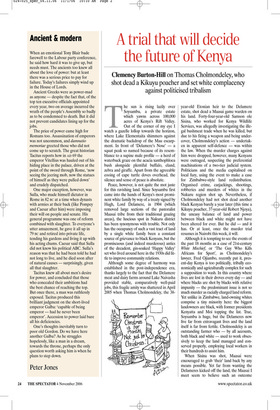Ancient & modern
When an emotional Tony Blair bade farewell to the Labour party conference, he said how hard it was to give up, but needs must. The ancients too knew all about the love of power: but at least there was a serious price to pay for failure. Today’s failures simply wind up in the House of Lords.
Ancient Greeks were as power-mad as anyone — despite the fact that, of the top ten executive officials appointed every year, two on average incurred the wrath of the people’s Assembly so badly as to be condemned to death. But it did not prevent candidates lining up for the jobs.
The price of power came high for Romans too. Assassination of emperors was not uncommon, and damnatio memoriae greeted those who did not come up to scratch. The great historian Tacitus reports how in AD 69 the emperor Vitellius was hauled out of his hiding place in the palace, driven at the point of the sword through Rome, ‘now seeing the jeering mob, now the statues of himself as they were pulled down’ and crudely dispatched.
One major exception, however, was Sulla, who made himself dictator in Rome in 82 BC at a time when dynasts with armies at their back (like Pompey and Caesar after him) were imposing their will on people and senate. His general programme was one of reform combined with slaughter. To everyone’s utter amazement, he gave it all up in 79 BC and retired into private life, tending his gardens and living it up with his acting chums. Caesar said that Sulla did not know his political ABC. Sulla’s reason was that he had been told he had not long to live, and he died soon after of natural causes — surprisingly, given all that slaughter.
Tacitus knew all about men’s desire for power, and concluded that those who concealed their ambitions had the best chance of reaching the top. But once there, a man was ruthlessly exposed. Tacitus produced this brilliant judgment on the short-lived emperor Galba: ‘capable of being emperor — had he never been emperor’. Accession to power laid bare all his deficiencies.
One’s thoughts inevitably turn to poor old Gordon. Do we have here another Galba? As he struggles hopelessly, like a man in a dream, towards the throne, perhaps the only question worth asking him is when he plans to step down.
Peter Jones


















































































































 Previous page
Previous page